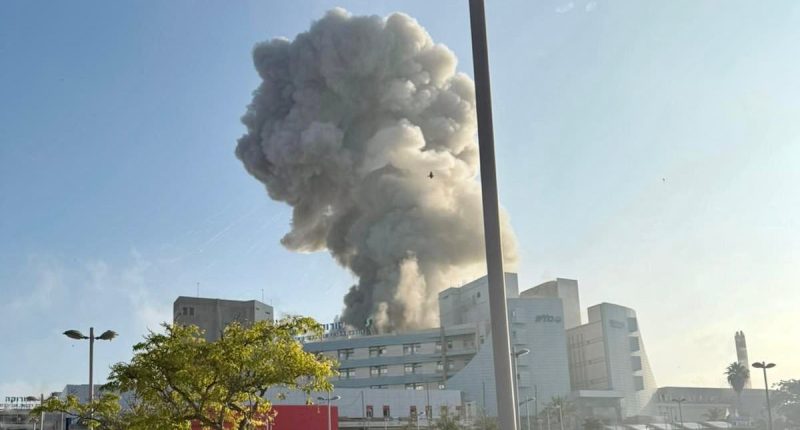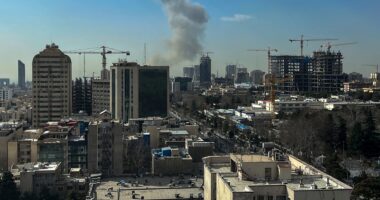Share this @internewscast.com
The building has not so much blown up as imploded. Thickets of metal protrude from what was once the roof of this apartment block.
It’s as if a vengeful god has reached down from the heavens and yanked out its steel entrails.
Next to it a skyscraper stands scorched, its side mottled with soot. The asphalt on the street below is torn, gaping open like a wound. Nearby, a carpet of shattered glass glints in the morning light.
I’m in Ramat Gan in central Tel Aviv, where an Iranian missile attack has just struck several residential buildings. Emergency services have cordoned off the impact site.
Police warn curious onlookers to watch their step, as throngs of gathered Press push against the makeshift barriers. One cheeky TV crew tries to scoot around them and is gently pushed back.
Just hours earlier, I was awoken in my hotel room by an air-raid siren sounding across the city. An automated Hebrew voice then wafted into my room: get to an air-raid shelter – fast.
A couple of soft thuds later, I understood that the city had just been hit.
Israel may indeed have mastery of Iran’s skies. It may be deploying its air defences highly effectively. But Iranian missiles are nonetheless getting through, and they are striking the heart of Israel’s premier city.

White smoke billows from the Soroka Hospital in Beersheba, southern Israel’s biggest hospital, after being directly hit by Iran’s ballistic missile on Thursday June 19, 2025

Rescue personnel evacuate a wounded woman at an impact site following missile attack from Iran on Israel, in Ramat Gan, Israel June 13

An Iranian missile attack creates a huge fireball as it explodes in Tel Aviv, Israel on June 13, 2025
One thing is clear to me: this war is far from over. Israelis understand this. And, for the moment, they are united behind their government. Prime Minister Benjamin Netanyahu remains controversial (and loathed by many), but for now the consensus is that resolving the country’s domestic politics can wait. It’s time to deal with Iran – once and for all.
The Israelis have had enough. And I don’t blame them. I have studied the drama of the Islamic Republic of Iran’s nuclear programme, and by extension the Iran-Israel conflict, for almost 20 years.
Iran’s war on Israel has been relentless. The mullahs declared a proxy war against the state of Israel in 1991. Ironically, this came after Israel had quietly sold them weapons during the eight-year Iran-Iraq war.
Jerusalem was desperate to rekindle relations with the state it had been allies with under the Shah, Mohammad Reza Pahlavi, before he was ousted in the Islamic Revolution of 1979. It got a de facto declaration of war in response.
Since then, the Iranians have expanded their malignant influence into Syria, Lebanon and Gaza to create what they call a ‘ring of fire’ around Israel – to scorch and burn the Jewish state at every opportunity.
It’s been effective. Even before the horrors of October 7, Iranian-backed proxies had killed and wounded thousands of Israelis.
Shortly after I left the crash site, I spoke to Dr Meir Javedanfar, who teaches Iranian politics at Reichman University, on the Mail’s weekly global news podcast, Apocalypse Now.
Like so many Israelis, he looked tired, the result of sleep deprivation following repeated night-time missile attacks.

Iran’s Supreme Leader Ayatollah Ali Khamenei speaks during a meeting with a group of students in Tehran, Iran on November 2, 2022

Khamenei vowed to ‘inflict heavy blows’ as he blames Israel for starting a war. Pictured: the skeletal remains of a building after a missile attack in Ramat Gan, Israel on June 13

Israel’s Iron Dome intercepting hundreds of missiles above Tel Aviv as Iran’s Supreme Leader blames Israel for starting a war
Javedanfar was born in Tehran, and he explained proudly to me: ‘Bar Mitzvah’d in Tehran, too!’ Like so many others, including myself, he once thought that some type of reform could come to the Islamic Republic.
But, like me, he saw that everyone who ever tried to bring reform was bypassed, imprisoned, tortured or killed.
The Iranians have not let up against Israel, even for a moment.
In a statement two days after October 7, Ayatollah Khamenei said that, while Iran was not involved in the Hamas massacre, the ‘hands and forehead of its planners must be kissed’.
Like so many Israelis, Javedanfar has had enough. ‘From now on, Israel refuses to live with a regime that sponsors terror organisations who kill our civilians,’ he told me.
‘The Iranian regime wants Israel dead. It wants Israeli citizens dead. It denies the Holocaust. It is so depraved that it has Holocaust cartoon competitions.
‘No Israeli government is willing to live with this any more. And so, on June 13 we acted – with amazing success, which was no surprise. Special operations are to Israel what watches are to Switzerland. Our expertise.’
Make no mistake, the war is tough on the people here. As I walk through the streets, the normally bustling city is quiet, bereft of traffic. I stroll along the promenade on Frishman Beach. Normally I’d eat at Greko, a Greek restaurant overlooking the Mediterranean Sea. But it’s boarded up.

Several people were injured after Tehran last night launched a barrage of missiles at Tel Aviv in revenge for attacks on its nuclear sites
Matthew Morgenstern, Professor of Aramaic at Tel Aviv University, sets out what Israelis are facing now.
‘Starting with Gulf War One in 1991, I’ve been through almost 35 years of wars here. But I’ve never experienced anything like this. Every single day, hundreds of people on the home front have lost their homes.
‘It seems that they only need to get one missile through a day and the damage is done. I’ve been calling this “Iranian Roulette” – will we be the ones to be hit this time?’
The mullahs are hoping that these attacks will force the Israeli government into abandoning the fight. I’m sceptical.
Throughout the day I trade messages and calls with a former defence official still in regular contact with the government and the security services. He sums up the mood here.
‘The people of Israel are incredibly determined and defiant,’ he tells me. ‘Despite the awful price we are paying personally, physically, emotionally, there is still wall-to-wall support for this operation. Netanyahu is not a popular prime minister here. But after almost two years of fighting wars against Islamic death cults on seven fronts, all backed by Iran, the people of Israel are saying enough is enough.’
I feel that sentiment all around me. It hangs in the air like the salt I smell drifting over from the Mediterranean Sea.
Two events over the past week have hardened resolve yet further. The first is the killing of a seven-year-old Ukrainian girl, Nastya Buryk , and her family in an Iranian strike on the coastal town of Bat Yam.

David Patrikarakos (pictured) writes: ‘If Britain, with all its history and expertise and capabilities, has truly given up on trying to influence world events then it’s better to just say nothing. Now is not the time to back down’
Nastya had come to Israel from Odesa for cancer treatment along with her grandmother Lena and two cousins, Konstantin, nine, and Ilya, 13, all of whom were killed alongside her. Her mother Maria is still beneath the rubble.
The second is Thursday’s missile attack on Soroka Hospital, in the southern city of Be’er Sheva, which serves the entire Negev region, not least the many Palestinians who go especially to be treated there.
According to Israel’s ministry of health, 71 people have been injured. The people are enraged. But they also know this cannot last for ever.
And there is one question that naturally comes to the Israeli mind: will the Americans get involved? Well, the Israelis are certainly keen that they do.
‘This is Trump’s Churchillian moment,’ the former Israeli defence official tells me.
‘He has the opportunity, with a day or two’s work, to strike at the heart of the worst and most destabilising regime since the end of the Second World War.
‘You don’t want the world’s most dangerous weapons in the hands of the world’s most dangerous regime.
‘Israel has already done most of the work. Trump can and must finish the job.’

The Israeli flag is reflected in the windows of a damaged building in Ramat Gan, Israel, two days after it was hit by a missile launched from Iran, Saturday, June 21, 2025
Trump can indeed finish the job.
As John Spencer, Chair of Urban Warfare Studies at the Modern Institute at West Point, told me on my podcast, the US has ‘one of the quickest solutions to the remaining nuclear sites. The massive ordnance penetrator, the GBU-57 – a 30,000lb bunker-busting munition that can penetrate 200ft into concrete and reinforced steel.’
Moreover, as Spencer also pointed out, it can only be deployed by the US B-2 bomber.
‘This is really the only military solution, and only an American bomb dropped from an American plane can deliver it,’ he said.
But is it certain to destroy nuclear facilities buried deep in the mountains? And will Donald Trump sanction its use?
So far the signs are mixed. Trump has been deploying the plural pronoun on social media, claiming ‘we’ – rather than Israel alone – have achieved extraordinary feats against the mullahs.
Trump remains wary of war. But, clearly, the urge to claim credit for what is – so far – an extraordinary military operation is pressing on him.
He’s given the ayatollahs two weeks to make a deal. This is probably no surprise.
If there’s one thing Donald Trump enjoys more than making a deal, it’s making a deal when the other side is so desperate he can put them over a barrel.
He’s betting that the mullahs, getting smashed up daily by Israel, need respite. He’s betting that he can exploit this fact to demand terms so tough that Iran’s path to a nuclear bomb is blocked, at least for now.
But Iran’s leadership also have a say. And they run a dictatorship, not a democracy.
Concede too much and they risk emboldening enemies, not least their own people.
For a regime built on projecting strength and fear, humiliation is fatal. If the mullahs refuse to fold, Trump may well decide to step in at the final moment and then take the credit.
If the Israelis are defiant, they are also confused.
In going after Iran’s nuclear programme, they are doing the world a service.
‘We are happy to take them out ourselves,’ a friend told me as we drank smoothies in a cafe just off Dizengoff in central Tel Aviv. ‘But why can’t you just give us your moral support? We’re doing this for everyone.’

Footage from a local TV channel has shown a huge hole blasted into a building in Tel Aviv with fires raging inside
She’s right. As German Chancellor Friedrich Merz recently observed: ‘This is the dirty work that Israel is doing for all of us.’
And yet, it seems we struggle to acknowledge even that. From our own government we hear the usual cringeworthy calls for calm and ‘de-escalation’.
Don’t they understand how ridiculous they sound? If Britain, with all its history and expertise and capabilities, has truly given up on trying to influence world events then it’s better to just say nothing. Now is not the time to back down.
The question is simple. What would we in Britain do if a country had for decades promised to wipe us off the face of the Earth?
What would we do if that country paid for proxy groups to launch thousands of rockets over decades at our towns and cities – at our children? If it provided the funding and training for the biggest massacre of British people since the Second World War?
What would we in Britain demand that our government do? The answer is unequivocal: bring that regime to an end.
The Israelis are just trying to take out Iran’s nuclear programme – to everyone’s benefit.
And they aren’t even asking us for the tools. Let’s at least support them as they try to finish the job.








